- Home
- E. M. Foner
Alien Night on Union Station (EarthCent Ambassador Book 2) Page 17
Alien Night on Union Station (EarthCent Ambassador Book 2) Read online
Page 17
“Bubbalo!” Dorothy exclaimed, thrilled to have the opportunity to use such a difficult word again.
“Bubbalo?” Kelly interrupted her conversation with Donna about the spots on predatory felines to stare across the table at her mother.
“Buffalo,” her mother corrected Kelly, and turned back to Dorothy. “Pronunciation is very important. When your mother was a little girl, she used to raise her hand in school and say she had to go to the bat room, so all the other children made fun of her.”
“Who is in Buffalo?” Kelly asked, barely noticing her mother’s first embarrassing story of the evening.
“Your brother’s in-laws are from Buffalo,” her mother told her. “You’d know that if you ever came to visit. They’re very nice people, though they do tend to go on about the Bills.”
“Oh. They’re having trouble getting by?” Kelly inquired sympathetically.
“Not that kind of bills, silly,” her mother retorted. “The Buffalo Bills. The professional football team. There aren’t enough people left living in the area to even fill the stadium so they have to play half of their games in Toronto, but all the locals who haven’t left the planet are big fans.”
“Isn’t Buffalo the place that used to get buried in snow ten times a winter?” Joe asked, just to show he was paying attention. “I seem to remember that from the news when I was a kid. I always wished I could live there so I could get days off from school.”
“Why would anybody keep living in a place like that now?” asked the ever-practical Donna. “What kind of work can anyone get in a city that can’t fill its own stadium?”
“Funny you should ask that,” Marge replied. “Just last year, Harold was getting so depressed from watching the city decay around him that he talked about abandoning the house to rot and moving to be closer to the grandchildren. But then, one of those new start-up businesses that come out of nowhere took off, and all of a sudden, people are moving to Buffalo in droves to work there.”
“What business is that?” Kelly asked quietly, as she dipped her dinner knife in the spaghetti sauce left on her plate and doodled something.
“I think it’s called Bill’s Change or something like that,” her mother replied casually. “They have something to do with games or money, I don’t remember the details.”
“Bill’s Exchange, in Buffalo, with all the Stryx cred commission money from selling Trader gold,” Blythe yelled from the end of the table. “I win. We get to run the commercial.”
“Ha!” Kelly shot back holding up her plate. “What does that say, smarty pants?”
“You think my spaghetti sauce was too runny?” Laurel asked. She sounded a bit hurt as she broke off her conversation with Patches, who was about to explain the origin of his nickname.
“No, not you, Laurel,” Kelly replied in exasperation, jerking the plate down. Sure enough, her hastily improvised lettering had slumped and elongated, but she thought she could still make out the scrawl. “Here, Donna. You read this,” she said, pushing the plate in front of her friend.
“Buff attack - share goldmine?” Donna deciphered the droopy hieroglyphics.
“Exactly!” Kelly pronounced triumphantly. “The attack on Buffalo the Stryx foiled a few months ago was the game makers sending a message to the moneychangers to share the profits, or else. I win, so you can’t run the ‘Eat me up!’ commercial.”
“Somebody attacked Buffalo?” Marge demanded. “Does anybody care to explain to me what you are all talking about?” She turned to Jeeves, who had been quietly observing or talking softly with Paul through most of the meal. “How about you, Mr. Jeeves? Everybody I’ve met during the trip says you can always trust the Stryx.”
“Certainly, Mrs. Frank,” Jeeves responded politely. “There was an incident a few months ago in which a large asteroid was detected on an interception course with Earth. We sent a science vessel to do some careful measurements and projected the impact point to be Buffalo. Nobody was ever in real danger, so it’s likely that your daughter was correct in describing it as part of a business negotiation.”
“I remember that from the news,” Marge replied, her voice rising. “They said that if the asteroid hadn’t been detected, it could have caused a global extinction event. That was part of a business negotiation?”
“Of course, we were aware of all the Stryx creds flowing into Earth, but we try not to pry into private business affairs,” Jeeves continued calmly. “The currency flow was distributed amongst locations all over the world, so the footprint of Bill’s Exchange in Buffalo was actually quite small in the scale of things. They probably spread the money around the globe to avoid the attention of your remaining tax authorities.”
“But why did I get all of the dinner invitations?” Kelly pressed Jeeves. “I know the Stryx don’t want to show favoritism with competitive information, but now we’ve figured out where the money was coming from and why it was going to Earth. Libby showed us the Stryx cred flow months ago, but large as that was, Earth’s economy is still small beans compared with any of the older species. Why did they all descend on Earth like locusts?”
“Gryph and the others aren’t happy about this, but I’m going to tell you anyway. And the reason I’m going to tell you is that it won’t change anything,” Jeeves said, almost sadly. “Do you remember being asked to the Grenouthian embassy, before all the other invitations started coming in?”
“Of course,” Kelly answered. “Joe had a terrible allergic reaction to the bunny fur.”
“The Grenouthians run their own entertainment network, and they produce quite a few documentaries about other species, which their population seems to find quite amusing. All of the interest in Earth began with a documentary about your pre-Stryx economic system.”
“Hard to believe the older species had something to learn from our market economies,” Stan interjected. “I spent a few years working on a doctoral dissertation, applying game theory to economic history, before I decided the system was all rigged in the old days. I dropped out to work in real gaming.”
“Why didn’t you ever mention that before, Stanley?” Donna asked in wonder.
“I was ashamed it took me so long to figure out,” he confessed.
“Unfortunately, your assumption that the Grenouthians weren’t interested in Earth for the sake of your knowledge is correct,” Jeeves picked up where he had left off. “The main focus of the documentary, which ended up breaking viewership records and getting translated into most of the popular languages in the galaxy, was the human affinity for Ponzi schemes.”
“Oh, you’re pulling our legs,” Kelly’s mother said, and gave Jeeves a playful push.
“Given the opportunity, most humans will choose to entrust their savings to whoever promises them the highest rate of return,” Jeeves explained. “The human implementation of financial markets which were utterly detached from the supposed underlying assets was unique in the galaxy. If it wasn’t for Bill’s Exchange, the other species would have gotten a good laugh from the documentary, and that would have been the end of it. But the combination of your financial gullibility with a significant inflow of Stryx cred proved too attractive for any entrepreneurial species to ignore.”
“I did quite a bit of research about historical real estate prices, and excluding a few boom towns, I came to the conclusion that prices were strictly a function of interest rates and how much money the government was printing,” Stanley chipped in.
“Correct,” Jeeves said approvingly. “The value of your assets was defined by the supply of money, which was arbitrarily controlled by your governmental banking authorities. It’s the exact opposite of how the rest of the galaxy does things. Of course, barter is always preferred, but where currency is necessary, it should be valued based on the backing assets, not the other way around. And that brings us to why the Stryx opened Earth when we did.”
“I heard it was because the Vergallians were getting ready to move in and add us to their empire, whether we wanted to o
r not,” Joe ventured.
“No, the Stryx only step in and interfere with the natural developments of a species and their place in the galaxy if we judge they are in imminent danger of unintentionally destroying themselves,” Jeeves spoke seriously. “You were actually progressing quite quickly for a species so far from the galactic center, and given a few hundred years, you would have developed a crude interstellar capability by your own efforts, probably using ships carrying frozen embryos with robot tenders.”
“How could you just assume we were going to destroy ourselves?” Kelly protested. “I’ve studied a lot of Earth history, and the relations between the biggest nations were pretty good when the Stryx came. In fact, I’ve read that even if one nation could have destroyed another without retaliation, they probably wouldn’t have, because of their economic ties.”
“My elders weren’t worried about Earth’s national rivalries,” Jeeves explained patiently. “The imminent danger was a global economic collapse, brought on by your bizarre financial system and your global addiction to pyramid schemes. Wars sparked by economic collapse are the worst kind, the wars that push civilizations back into their stone age, or to total extinction.”
“Sounds like humans were real losers,” Chastity commented from the end of the table.
“If any of you are looking for a great investment, I have a tunnel on Drazen I could sell you,” Tinka added, and the two girls dissolved into laughter.
“What about all this business with the military reorganization and the new trade routes we went to scope out?” Joe asked, still smarting from the loss of a keg tap.
“Probably the Verlocks,” Kelly answered with a burst of insight. “If not the Verlocks, whoever created this annoying game that all of the kids are playing. They’re mining the data from the trades in the gameverse, like Blythe suggested, and they’re using it to make a killing in the real universe.”
“I think I’d like to invest with these Verlocks,” Kelly’s mother mused. “It sounds like a sure thing.”
“I’ve been meeting the local Verlocks about business. Do you want me to ask for you?” Blythe offered helpfully. “How much are you looking to invest?”
Kelly sat back with a smug little grin, ready to enjoy seeing her mother embarrassed for the first time, ever.
“I think about a million Stryx cred would be a good start,” Marge replied. “I took a hit on corn contracts when it rained right through the Midwest harvest season this year, so I’m a little cash poor.”
The blood all drained from Kelly’s face as she stared across the table. “What are you talking about, Mother. You never even made enough money in your bake shop to pay for the electricity!”
“That’s why I got interested in commodities trading,” her mother replied. “I wanted to hedge the cost of sugar and flour. After I closed the shop, I started taking it more seriously and built up a nice nest egg. And when the space elevator opened up a few years ago, demand for commodities exploded, and I found myself a wealthy woman.”
“It’s not fair,” Kelly reacted angrily. “All those years you were calling me collect when I couldn’t pay the rent on time and my apartment was playing mean tricks with the temperature. Were you laughing at me?”
“Oh, Kelly. Of course, not,” her mother said in a soothing voice. “At first, I was trying to teach you to stop making impulse purchases, but for some reason, you always accepted the charges. After a while, I just hoped you’d figure out that it was cheaper to come home and visit us than to pay for all of the calls. But you always did the opposite of whatever I expected.”
“Well, I’m ready for another beer,” Joe said awkwardly in the pause that followed. “Who wants one?” Everybody at the table except for Dorothy and the Jeeves raised their hands.
“Listen to this,” Laurel said in the conversational lull, while they waited for Joe to return with a couple of pitchers. “Patches explained where his nickname is from. Tell them, Patches.”
“It’s not a big deal,” the gangly youth mumbled. “I was just the first human to complete all of the Station Scout merit badges. When I sewed them all onto the uniform, there really wasn’t any uniform left. So everybody started calling me ‘Patches.’”
“I think it’s sweet,” Laurel said, appropriating his arm. “He even earned the merit badge for helping a Dollnick build a nest.”
Everybody started pushing the embarrassed young man to describe his other meritorious activities, which turned out to include a surprising number of the inter-species activities equivalent to helping an old lady to cross the street. Kelly remained quiet, stealing an occasional glance at her mother, who was fully engaged by Dorothy’s chatter.
“Libby?” Kelly subvoced.
“Yes, Kelly,” Libby answered immediately over Kelly’s implant. “Were you shocked by what Jeeves told you? Gryph and the others thought it came too close to giving away competitive business information about other species. But Jeeves insisted they aren’t competing against Earth as much as they are competing against each other to attract capital from gullible humans.”
“Oh, that,” Kelly responded. “No, I don’t care about that. I guess I’m just feeling stupid. Today I found out in front of my family and my friends that my mother is rich, and she called me collect all these years to teach me a lesson.”
“You just won your bet with Blythe, figured out the Raider/Trader ties to the real economy, and you’re calling yourself stupid?”
“I guess,” Kelly replied vaguely. “Anyway, life should make a lot more sense from now on.”
“Maybe you’ll even stop talking to yourself,” Libby added encouragingly. “You know, you forgot to schedule the week off from work while your mother is here. I arranged it with EarthCent, so you don’t have to do anything other than relax,” the station librarian concluded and withdrew from contact.
Joe returned with two full pitchers of beer, and Kelly gladly accepted a refill as she tried to process everything that had just taken place. Looking on the bright side, her mother and Dorothy got along like a house on fire, so at least it meant a week without having to call InstaSitter.
Twenty-One
Kelly returned to the ice harvester after crying when her mother’s passenger liner departed Union Station. She didn’t know which of them had changed more with the years, but she no longer dreaded the idea of having her mother visit again. Kelly even promised to keep her eyes open for any good apartments that came up for sale in the human section.
Joe was sitting on the couch watching Dorothy play some incomprehensible game with Metoo when Kelly returned. Each player was equipped with a pile of colored slips of plastic that they added to a shared pile located between them, but Joe couldn’t figure out the rules of order. Speed and accuracy of placement didn’t seem to count for much either.
“Feel like a beer?” Joe asked her hopefully. Beowulf raised his head from Joe’s lap and added a pleading look to Joe’s unsubtle hint.
“No, but I’ll get you one,” Kelly replied. “And some pretzels.” Beowulf thumped his tail. She took Joe’s glass, went down a level to fill it from the current keg, poured some mini-pretzels from a bag into a bowl, and returned.
“Aw, you didn’t have to go to so much trouble,” Joe thanked her, accepting the beer and the pretzel bowl. The truth was that he always ate pretzels out of the bag because it helped establish his dominance in the eyes of the giant dog. With the pretzels already in a bowl, who needed thumbs? Beowulf eyed the pretzels speculatively, thinking pretty much the same thing.
Kelly sat on the arm of the couch, nibbled a few pretzels herself, and watched her daughter slap a blue slip of plastic on a pink one. “Good move,” she called, not having a clue what was going on. Dorothy beamed back.
There was a polite knock on the open door of the ice harvester, and Dring appeared, carrying a copy of Trollope’s novel, “The Way We Live Now.”
“Dring, come in,” Kelly rose and went to greet her reptilian friend. “How did you like the bo
ok?”
“Very enjoyable,” Dring told her. “It reminded me of that amusing Grenouthian documentary about humans.”
“Well, just remember that it’s fiction, not history,” Kelly replied defensively, though she couldn’t have said why.
“And how were your mother’s visit and your vacation?” Dring asked politely.
“Great,” Kelly admitted. “Now that it’s over, I can’t believe I went so long avoiding my family. And taking a week off from those diplomatic dinners was a relief as well. Did I tell you that Libby worries I talk to myself? I’m beginning to wonder if it’s the Stryx who are crazy. I don’t talk to myself, do I?”
Dring looked away guiltily, and his tail gave a convulsive twitch, which Kelly had come to associate with embarrassment on the part of the dinosaur-like alien. Something about family and talking to herself clicked in Kelly’s brain, and she maneuvered to put Dring between herself and Metoo. Then she stepped to the side, held up a hand, and called out, “Metoo! How many fingers am I holding up?”
Metoo looked up from the game and tilted his head in consternation. “You cut your arm off!” he exclaimed. Kelly quickly brought her arm out from where Dring was blocking the little Stryx’s view of her hand, so that Metoo wouldn’t get upset and put himself to sleep. “Oh, there it is. You aren’t holding up any fingers,” the little Stryx observed, then quickly returned to the game. Dorothy had taken advantage of Metoo’s momentary inattention to recover some prize slips of plastic from the central pile, but if the Stryx had noticed, he didn’t say anything.
Dring shifted uncomfortably and made a throat-clearing sound. Kelly waited for him to speak, but instead, he turned and waddled off in the direction of the bookshelves.
“Dring,” Kelly spoke sharply. The alien turned towards her reluctantly. “They can’t see you, the Stryx, can they!”
“We aren’t invisible,” Dring mumbled uncharacteristically. “I was thinking of trying another Jane Austen. What would you recommend?”

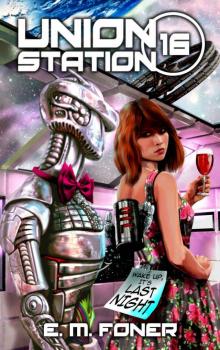 Last Night on Union Station (EarthCent Ambassador Book 16)
Last Night on Union Station (EarthCent Ambassador Book 16)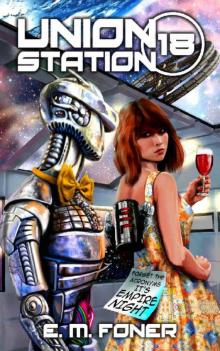 Empire Night on Union Station (EarthCent Ambassador Book 18)
Empire Night on Union Station (EarthCent Ambassador Book 18)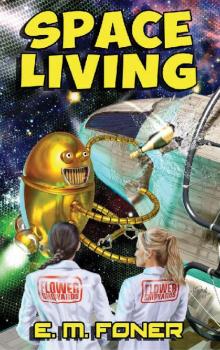 Space Living (EarthCent Universe Book 4)
Space Living (EarthCent Universe Book 4)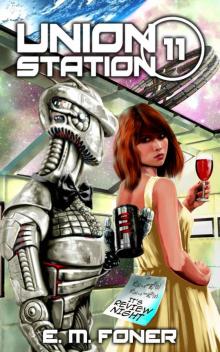 Review Night on Union Station (EarthCent Ambassador Book 11)
Review Night on Union Station (EarthCent Ambassador Book 11)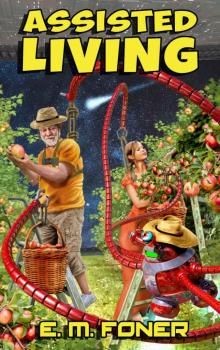 Assisted Living
Assisted Living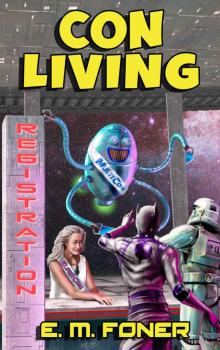 Con Living
Con Living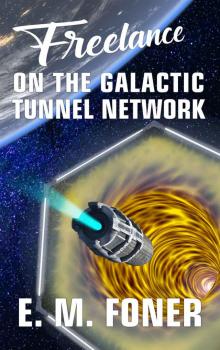 Freelance On The Galactic Tunnel Network
Freelance On The Galactic Tunnel Network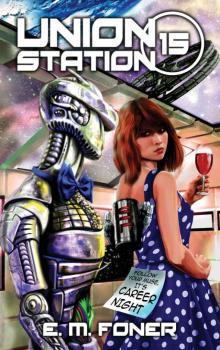 Career Night on Union Station
Career Night on Union Station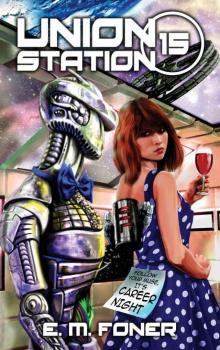 Career Night on Union Station (EarthCent Ambassador Book 15)
Career Night on Union Station (EarthCent Ambassador Book 15)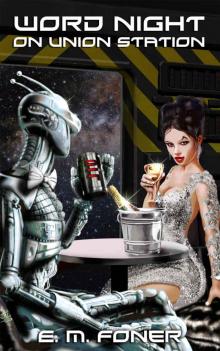 Word Night on Union Station (EarthCent Ambassador Book 9)
Word Night on Union Station (EarthCent Ambassador Book 9)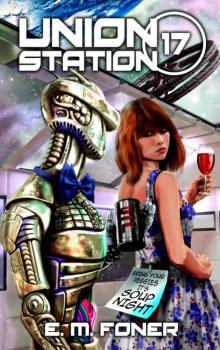 Soup Night on Union Station
Soup Night on Union Station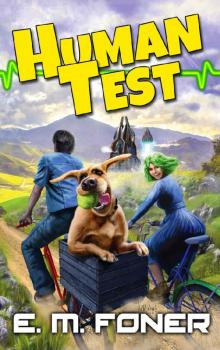 Human Test
Human Test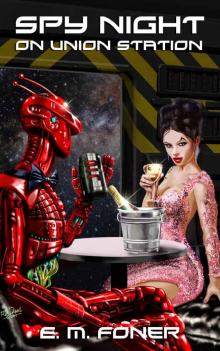 Spy Night on Union Station (EarthCent Ambassador Book 4)
Spy Night on Union Station (EarthCent Ambassador Book 4)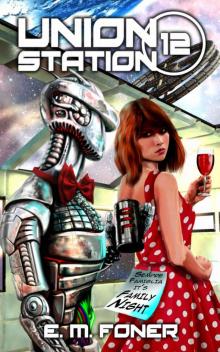 Family Night on Union Station (EarthCent Ambassador Book 12)
Family Night on Union Station (EarthCent Ambassador Book 12)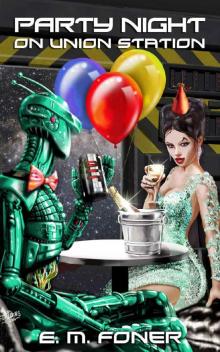 Party Night on Union Station (EarthCent Ambassador Book 10)
Party Night on Union Station (EarthCent Ambassador Book 10)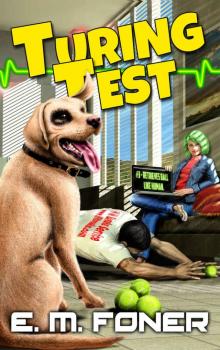 Turing Test
Turing Test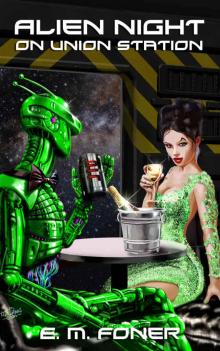 Alien Night on Union Station (EarthCent Ambassador Book 2)
Alien Night on Union Station (EarthCent Ambassador Book 2) Wanderers On Union Station (EarthCent Ambassador Book 6)
Wanderers On Union Station (EarthCent Ambassador Book 6)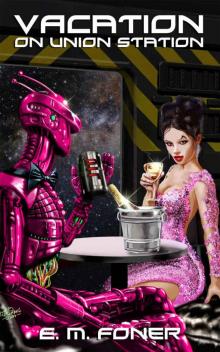 Vacation on Union Station (EarthCent Ambassador Book 7)
Vacation on Union Station (EarthCent Ambassador Book 7)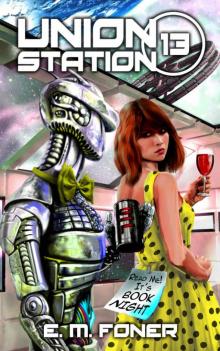 Book Night on Union Station (EarthCent Ambassasor 13)
Book Night on Union Station (EarthCent Ambassasor 13)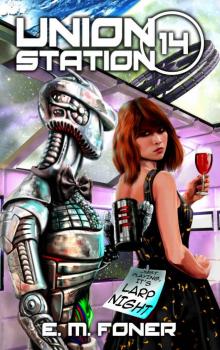 LARP Night on Union Station
LARP Night on Union Station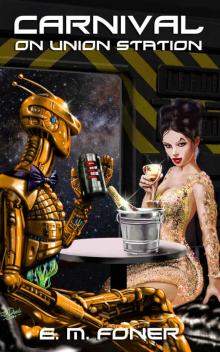 Carnival On Union Station (EarthCent Ambassador Book 5)
Carnival On Union Station (EarthCent Ambassador Book 5)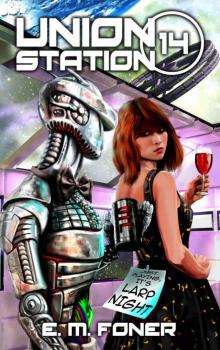 LARP Night on Union Station (EarthCent Ambassador Book 14)
LARP Night on Union Station (EarthCent Ambassador Book 14)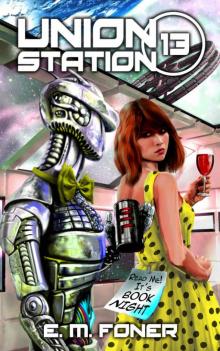 Book Night on Union Station
Book Night on Union Station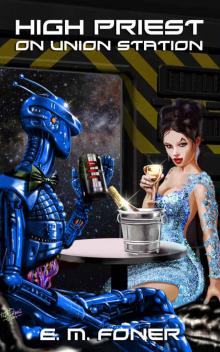 High Priest on Union Station (EarthCent Ambassador Book 3)
High Priest on Union Station (EarthCent Ambassador Book 3)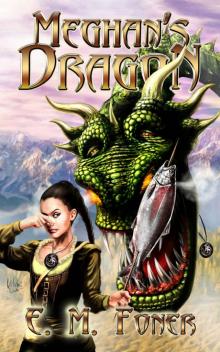 Meghan's Dragon
Meghan's Dragon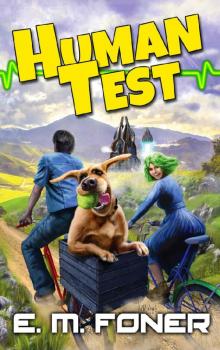 Human Test (AI Diaries Book 2)
Human Test (AI Diaries Book 2)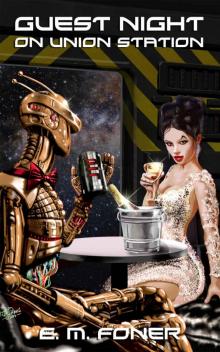 Guest Night on Union Station
Guest Night on Union Station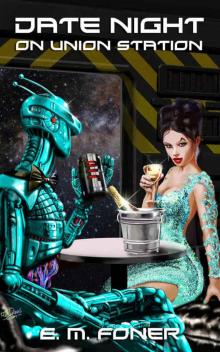 Date Night on Union Station
Date Night on Union Station